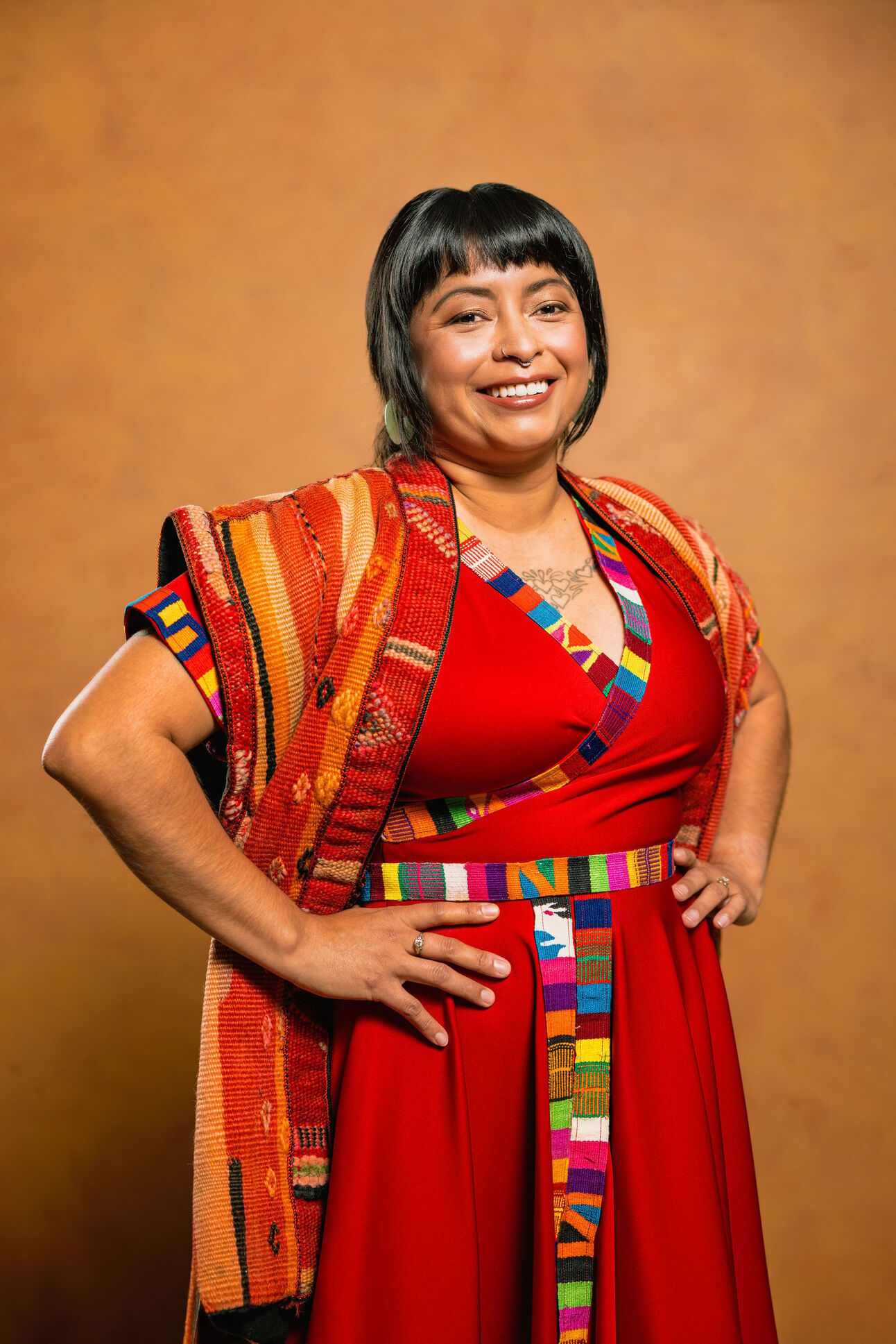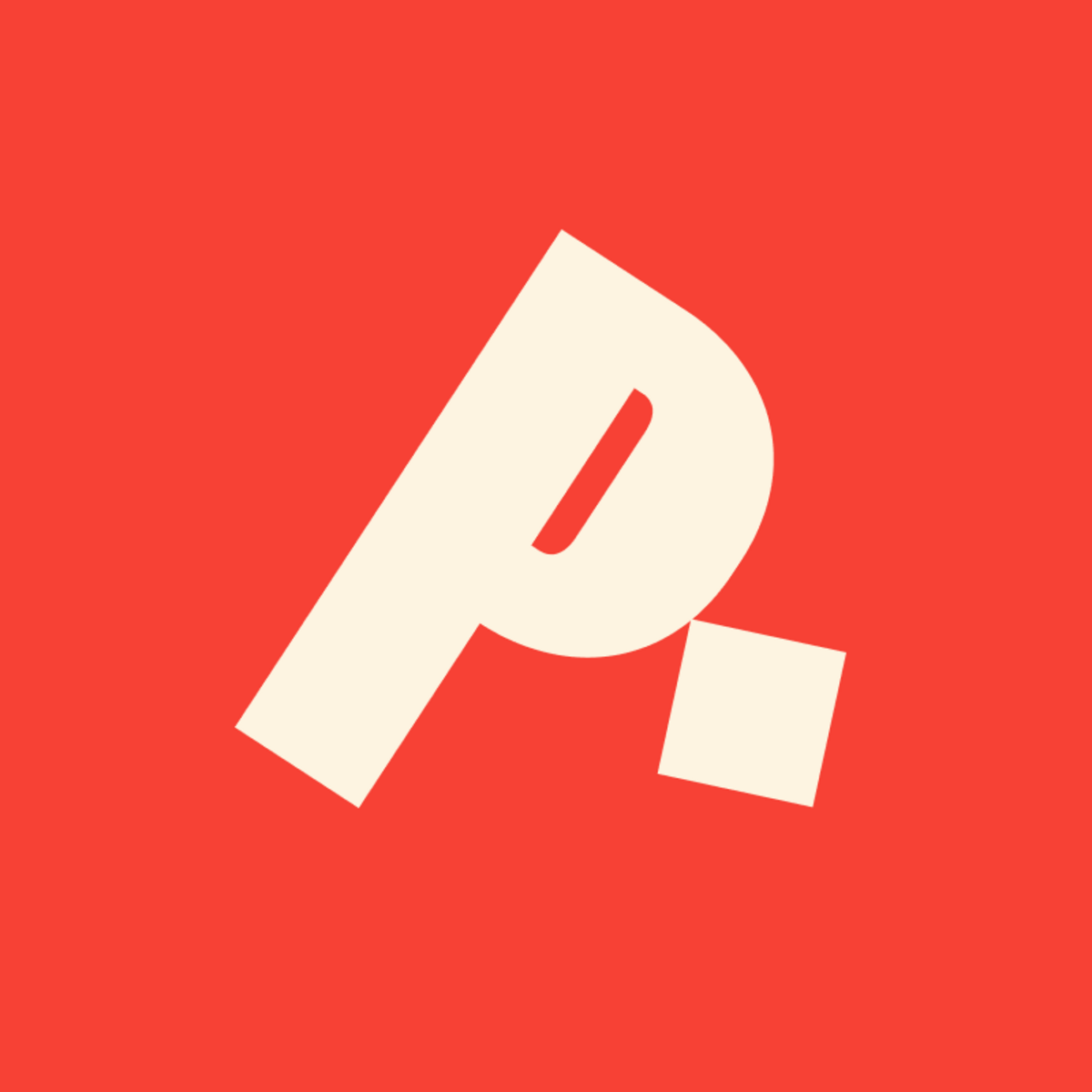
Turn Up the Heat: Consuelo Lockhart makes her own path as she inspires and cultivates community among women in a male-dominated industry.

Photography by Francis Nwosu, style by Katie Marple, hair and makeup by Lorena Somers, dress provided by subject, vest from Lux & Ivy
Consuelo Lockhart, founder and executive director of the Latinas Welding Guild, is a true powerhouse. You know that sixty-foot replica of the Eiffel Tower installed downtown for the Olympic Swim trials? Yeah, she made that.
We recently had the privilege of speaking with Lockhart about her path from an art school student to an Indy community icon. And here we’re sharing an abridged version of that conversation with a few of our favorite parts. Enjoy!

Design by Jacob Chaves, clothing provided by subject
Polina Osherov: Can you tell us a bit about your background and how you got into welding? You went to art school as a functional artist. What about welding attracted you?
Consuelo Lockhart: I didn't know anything about welding before I went to art school. When I was in college, a professor encouraged me to do a little bit of welding. I was like, I don't know what that is, but I guess I'll try. I ended up really loving it.
PO: You moved to Indiana in 2016. What prompted that?
CL: It's not a glamorous story. I moved here for an ex-boyfriend. It was kind of a fresh start. I never thought about Indiana or the Midwest as a next location.
We broke up and I had to decide if I wanted to stay here. I had already gotten hired to run a makerspace locally, Ruckus Makerspace. Through that position, I was able to meet different types of entrepreneurs and creatives, and they turned out to be great connections. I was finally in a place where I felt like I had good momentum to make a difference. And I felt like I was really lucky to have an employer who believed in this vision that I had too.
I wanted to create this incubator that has a lot of women, a lot of marginalized communities, people from different walks of life coming through. So I was like, I'm not going to move because of an ex-boyfriend. I don’t live with him, I won’t see him. And it worked out for me.
PO: That's a great story. It humanizes you–with all of your accomplishments and everything that you've done, you're almost like superhuman. We're glad you stayed. And I remember Ruckus! Such a great concept of equipment sharing, opening the door to trades, and creating a hub for creatives and makers. It sounds like it had some really good outcomes for you.
CL: I think so. I launched the Latina's Welding Guild out of Ruckus wanting to have welding as a part of the makerspace, but I mostly wanted it for art.
When I was learning the trade, it was often overwhelming. I had a lot of self-doubts, thinking I wasn’t smart enough or that I didn’t have what it would take to become a successful welder because I'd only ever seen men do it—and men are like born knowing how to weld and do all these mechanical and technical things.
PO: [laughs]
CL: But then I thought, why don't we try to break down some of those barriers, especially in the creative world? So I connected with one of the attorneys that we had built a good relationship with, and they actually filed the entity pro bono. People were already saying, hey, we heard you're trying to do this women's welding program. Honda was one of the first groups that was like, hey, we'll donate money, but you have to be an entity before we can do that. So then that obviously pushed me into taking it more seriously and formalizing it.
I have been constantly learning ever since. I knew nothing about a nonprofit structure. So running a board, budgeting and spreadsheets and staff. And figuring out the certification side of the program was really tough because it's such a technical skill. It's like night and day from where I started and where I am today.

PO: What is the thing that keeps you going in those times when you're like, okay, I bit off more than I can chew, I don't even know if I should be the one doing this, why am I doing this?
CL: A year and a half ago I had a moment where I was like, you know what? I'm not happy. I don't want to do this anymore. There are days when I feel like people understand that I'm trying, and then there are other days when I think everybody hates me and I can't do anything right. But I’ve stuck with it. Because of the impact.
The change I've seen in people's lives. The fact that I've met women who talk about how they don't have very much self-worth and that their friends and family are telling them every day, there's no way you could do this. You're too small, you're too old… But I am there to say you can do this! Because I had the same exact doubts for myself.
But the thing is, you have to do it for you. Don't do it for them. You built a career. That's something that you did. They didn't do that for you, and so you can rub it in their face.
PO: I bet you have lots of stories like that at this point.
CL: I do. But also, I think about it from a national perspective. The industry is so white male-dominated that, if I quit, then things go back to the way they were. I don't think I'm necessarily a huge influence on the industry, but I’ve forced myself to have a seat at those tables, and I've challenged one of the largest organizations in the industry.
But I'm also trying to be conscious because as a professional I can't just go off on people because they don't understand what the real issue is. I have to approach things in a way that they listen to me. I've definitely felt like I'm bringing a different perspective and a voice. A lot of other people who have tried to do this have given up. They're just accepting the way things are. But I don't. I can't just be complacent.
PO: Where do you think this commitment and stubbornness come from? As you said, most people would have thrown in the towel, but you haven't. That sets you apart and into a very special group of people who are trying to drive change.
CL: I'll always joke that I'm a masochist. ’Cause it's like, why would I subject myself to this? But I think it's because I know that there is change coming. And if I can help be an influence or even just to listen, I would love to be a part of that.
PO: So welding is an incredible career. What is your pitch if you feel like you had to give one to women who are looking for a challenging, exciting, very different career?
CL: Well, it's definitely challenging and exciting, and what's nice about welding is you can do it anywhere. We get folks certified with a nationally accredited certificate, which is also recognized in Germany, Mexico, and Canada. That means you can take that certification anywhere you want to go. And the certification is just a stepping stone.
There's also a lot of money. You have a lot of leverage right now, especially for women and minorities who are trying to get into the industry. Companies are finally being forced to realize that their work conditions have to change if they want to have more employees. So I think right now, diverse welders have a lot more leverage for asking for higher pay and just having consistent work.
PO: Okay, last question: tell us just a little bit of the backstory of the Eiffel Tower structure.
CL: I was asked to join the Olympic Swim Trials Indy Experience Committee back in November 2022. We started having meetings and spitballing ideas. And I finally just flat out was like, hey, our group will weld whatever. If we want to run public workshops, we can run some public workshops. At this point, we just want to see welding be a part of it. Somebody mentioned how the trials are here, but then everyone's traveling to Paris for the actual Olympics, and someone else was like, oh, we should do the Eiffel Tower, and everyone was onboard with the idea.
It was definitely a learning experience. There are a lot of things I wish I would have done differently, but overall, it was a whirlwind of highs and lows for everybody involved. We had such a tight timeline and there were so many details to get right, but also it was a huge team effort, and it looked amazing in the end.
PO: It’s definitely going to go down in history as epic! The big question is, what happens to it when all this is said and done?
CL: Thankfully, that's not my problem! (laughs) The Indiana Sports Corp is going to figure out where it's going to go. It's completely out of our hands.
PO: Well, no matter where it ends up, that’s a hell of a thing to have on your resume! Congrats to you on all of your success, and thanks for sticking it out and for driving change. We really appreciate you coming out to talk with us.
CL: Absolutely. Thank you for having me.

Stay Connected
PATTERN is a 501(c)(3) public charity. Your donations make our work possible.
Subscribe to our Print Magazine and support creatives across the state.
Love our work? Hire us! We’re obsessed with storytelling and design. Email [email protected] with details for a quote.
This story was made possible thanks to the generous support of our friends at Life in Indy.

